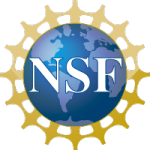The summer 2007 OCB Science Workshop was held July 23-26, 2007. This workshop sought to recognize new research opportunities at the interface between traditional disciplines. Participants were encouraged to “think outside the box” of their own immediate research communities and communicate with scientists in other disciplines.
- Workshop Themes
- Agenda with Presentation Slides
- Poster Information
- Workshop Report
1. Workshop Themes
This workshop focused on three primary interdisciplinary themes:
The interplay between biotic structure and biogeochemical cycles
Speakers explicitly address the two-way interactions between the structure and organization of biotic communities and the rates and pathways of elemental cycling in the ocean.
Changing Ocean Biogeochemistry: The Prediction Challenge
This session sought to stimulate discussion regarding predictions of future change in ocean biogeochemistry. Ocean acidification and ocean carbon storage were the foci for the breakout sessions.
Cross-boundary fluxes in the coastal ocean
This session addressed fluxes between the land margin-coastal ocean interface and the ocean-atmosphere interface.
Each afternoon, breakout groups gathered to further identify research opportunities on these themes. The purpose of the breakout groups was not to identify all research priorities of OCB, but to amplify research opportunities on the subselection of OCB topics highlighted for the 2007 workshop. Open forum breakout groups were held on the last morning of the conference to address other issues of interest to participants.
Posters were invited on the three themes above, as well as on other aspects of ocean biogeochemical research.
2. Agenda with Presentation Slides
Monday, July 23, 2007
Introduction
8:30 Overview and progress on OCB: Scott Doney, Chair
8:45 Agency perspectives on OCB: NSF, NASA, NOAA
Theme I. The interplay between biotic structure and biogeochemical cycles
9:30 Joe Vallino, Marine Biological Laboratory: Can Dynamic Trophic Structures Be Captured in Structurally Fixed Models?
10:10 Mak Saito, Woods Hole Oceanographic Institution: Trace Metal Biogeochemistry and Ocean Carbon: GEOTRACES, Colimitation, Marine Bioinorganic Chemistry, and the Continuing Pursuit of the Elusive Meaning of Bioavailability
11:20 Deborah A. Bronk, Virginia Institute of Marine Science: The Marine Nitrogen Cycle – Who is Doing What?
12:10 Tatiana Rynearson, University of Rhode Island: Plankton Biogeography – Using Population Genetics Tools to Examine the Interplay of Biotic Structure and Biogeochemical Cycles
14:00 Breakouts (two foci tbd, Biotic Structure and Biogeochemical Cycles 1 and 2)
16:00 Posters
18:00 Reception
Tuesday, July 24, 2007
Reports back to plenary, theme I (10 minute report, 10 minute discussion)
8:30 Biotic Structure & Biogeochemical Cycles: Breakout I
8:50 Biotic Structure & Biogeochemical Cycles: Breakout II
Theme II. Changing Ocean Biogeochemistry: The Prediction Challenge
Chairs: Joan Kleypas / Galen McKinley
9:10 Steve Murawski, NOAA Fisheries: Biogeochemistry Matters!: Implications of Ocean Acidification for Marine Ecosystems
9:50 Jeremy Blackford, Plymouth Marine Laboratory: Acidification and the Marine Ecosystem: Synthesising Experiments and Models
11:00 John Dunne, NOAA Geophysical Fluid Dynamics Laboratory: Carbon System Prediction: Approaches, Challenges and Opportunities for Earth System Modeling
11:40 Dave Siegel, University of California – Santa Barbara: What Can We Learn About Ocean Biogeochemistry from Satellite Data?
14:00 Breakouts (See end of agenda for specific questions to be addressed.)
Breakout I: Understanding ocean acidification
Breakout II: Predicting future ocean carbon storage
Wednesday, July 25, 2007
Reports back to plenary, theme II (10 minute report, 10 minute discussion)
8:30 Changing Ocean Biogeochemistry: Understanding ocean acidification
8:50 Changing Ocean Biogeochemistry: Predicting future carbon storage
Theme III. Terrestrial / coastal ocean cross-boundary fluxes
Chairs: Chris Sabine / Wade McGillis
9:10 Arthur Chen, National Sun Yat-sen University, Taiwan: Cross-Boundary Transports of Carbon across the Land-Continental Shelf, Continental Shelf-Open Ocean and Ocean-Atmosphere Boundaries
9:50 Walter C. Oechel, San Diego State University: Carbon Dioxide and Methane Eddy Covariance Flux Towers for Comparative Coastal Ocean and Terrestrial Fluxes
11:00 Sybil Seitzinger, Rutgers University: Linking Watersheds to Coastal Systems – a Global Perspective on River Transport of N, P and C – Past, Present and Future
11:40 Ajit Subramaniam, Lamont-Doherty Earth Observatory: Tropical Rivers Enhance Carbon and Nitrogen Cycles
14:00 Breakouts
Breakout I: River-dominated systems
Breakout II: Carbon and ecology in coastal regions
Thursday, July 26, 2007
Reports back to plenary, theme III (10 minute report, 10 minute discussion)
8:30 Cross-Boundary Fluxes 1: River-dominated systems
8:50 Cross-Boundary Fluxes 2: Carbon and ecology in coastal regions Updates: resources and connections
9:10 Hugh Ducklow, Marine Biological Laboratory: LTER Sites
9:20 Frank Muller-Karger, University of South Florida: The Role of the Ocean Studies Board (National Research Council)
9:30 Joachim Segschneider, Max-Planck-Institute of Meteorology: CARBOOCEAN
9:40 Chris Sabine, NOAA/Pacific Marine Environmental Laboratory: Time-Series Stations
9:50 Wade McGillis, Columbia University: Ocean Observatories Initiative
10:30 Plenary discussion: Setting OCB Priorities
Breakout discussion questions:
1. What are the key unknowns in this area?
2. What observations and/or modelling studies are needed to improve our understanding?
3. How reliable are current predictions? What are the major barriers to prediction?
4. What information does the scientific community need to provide for policy discussions? What questions do we need to be prepared for?
5. How can OCB best contribute to progress in this area?
Breakouts:
- Biotic Structure and Biogeochemical Cycles
- Predicting Future Carbon Storage
- Food Webs
- Margin Fluxes with Large Land/Ocean Exchange
- Ocean Acidification
- Coastal Carbon and Ecology
- Questions
3. Poster Information
2007 OCB Workshop Poster Abstracts
4.Workshop Report
Benway, H.M. and S.C. Doney, 2007: Advancing the Integration of Marine Ecosystem Dynamics and Biogeochemistry, EOS, Trans. American Geophys. Union, 88(47). PDF
2007 Workshop Sponsor




